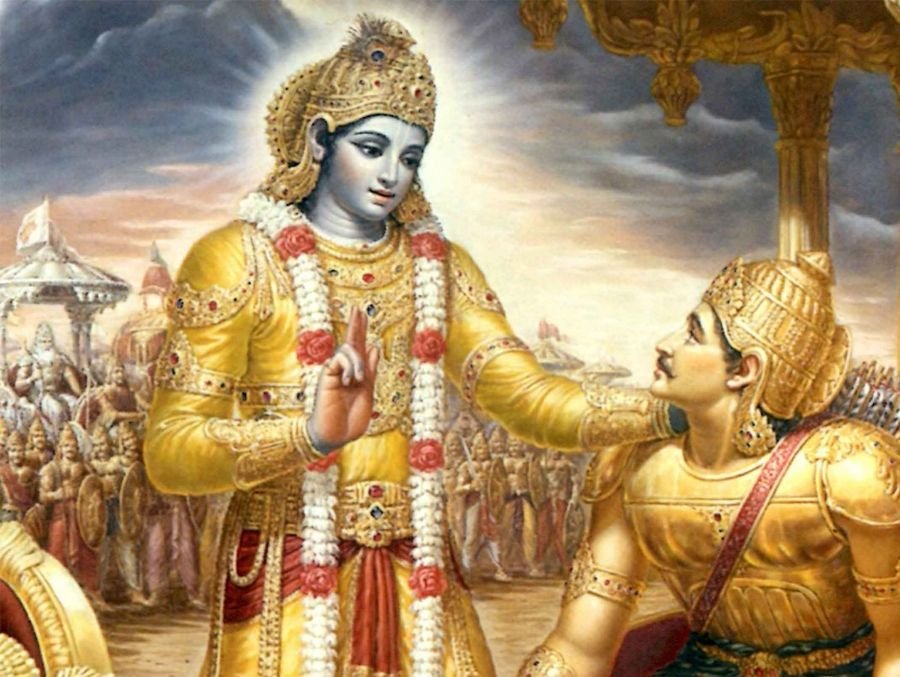(Image Courtesy Mahanidhiswami)
Being Dependent On The Divine, Devoted To The Divine, Detached From The World, And Without Hatred For Anyone Is What Devotion Means
मत्कर्मकृन्मत्परमो मद्भक्त: सङ्गवर्जित: |
निर्वैर: सर्वभूतेषु य: स मामेति पाण्डव || 11.55||
mat-karma-kṛin mat-paramo mad-bhaktaḥ saṅga-varjitaḥ
nirvairaḥ sarva-bhūteṣhu yaḥ sa mām eti pāṇḍava|| 11.55||
Shloka Translation
BG – Ch. 11- Ver. 55:
That person attains me, O Pandava, who performs deeds for me, regards me as highest, is committed to me, is devoid of attachment, and has no hatred for all beings.
Explanation
Arjuna had been taught by Shree Krishna to focus his concentration on him and devote himself to him. He wanted to share more mysteries about himself to strengthen that dedication, which he did in the tenth and eleventh chapters.
He had previously underlined the primacy of the path of devotion in the previous verse. He now brings this chapter to a close by noting five characteristics of persons who practice exclusive devotion:
They carry out all of their responsibilities for my benefit: Successful devotees do not distinguish between material and spiritual endeavours. They do everything for the delight of God, dedicating everything they do to him.
They are reliant on me: Those who rely solely on spiritual efforts to reach God are not completely reliant on him. This is due to the fact that he is gained through grace rather than spiritual practice. His devoted followers don’t even rely on their dedication to get close to him. Rather, they put their complete trust in his grace and regard their devotion as only a means of attracting divine grace.
They are completely loyal to me: Other spiritual acts, such as cultivating Sankhya knowledge, practicing hatha yoga, performing fire offerings, and so on, are not felt to be necessary by the devotees. In this way, people believe their relationship is solely with God. They only see their Beloved Lord, who pervades all objects and people.
They have no attachments: Devotion necessitates mental involvement. This is only feasible if the mind is free of external influences. As a result, exclusive devotees are free of all worldly attachments and focus their minds solely on God.
They have no ill will against anyone: If the heart is filled with animosity, it will no longer be solely focused on God. Thus, even toward people who have wronged them, exclusive devotees have no hatred. Instead, believing that God dwells in the hearts of all beings, they attribute all deeds to him and forgive even their wrongdoers.
Verse & what we can learn
The substance of the Bhagavad Gita is contained in the eleventh chapter’s final shloka. Ishwara can be obtained by following five instructions, according to Shri Krishna: conduct deeds for the sake of Ishwara, fix Ishwara as the ultimate objective, observe single-pointed devotion to Ishwara, keep free from worldly attachments, and do not harbour likes or dislikes.
These principles appear throughout the Gita, but this is the first time Shri Krishna explains how they fit together as a coherent whole. First, he instructs us to do karma yoga, or dedicating selfless activities to Ishwara. He then suggests that we make Ishvara our ultimate goal. This is jnyana yoga, or knowing yoga. However, we require something to help us transition from karma yoga to jyana yoga. The yoga of devotion, or bhakti yoga, is revealed as the third phase. With a mind saturated with the impurities of likes and dislikes that cause material attachment, none of these processes can be completed. The fourth and fifth phases, which include liberation from worldly attachments as well as likes and dislikes, address these issues.
The fourth and fifth phases, which include liberation from worldly attachments as well as likes and dislikes, address these issues. All five steps are linked and reinforce one another. The mind is unable to completely separate itself from everything. Shri Krishna instructs us to remove attachments to material things and build connection to Ishvara.
When we learn to see everything as Ishvara and ourselves as a part of Ishvara, we shall have no negative feelings toward anyone or anything, just as we have no ill feelings toward any part of our own bodies. This is the central concept of this chapter, in which the individual essence recognizes itself as a part of a larger whole.
To acquire knowledge and to implement that knowledge in life one needs to be mentally and physically active and healthy and for that daily meditation is a great tool.
There are various types of meditation like Buddhist meditation, heartfulness meditation, mindfulness meditation, meditation for stress, and each meditation benefits are countless. There is also numerous meditation techniques for beginners which help in practicing daily meditation so go ahead and start your journey towards a peaceful and balanced life.
In the next chapter, next Shloka Arjuna questions Shri Krishna.
Let’s learn to live with “The Gita” via Meditation Affinity…
